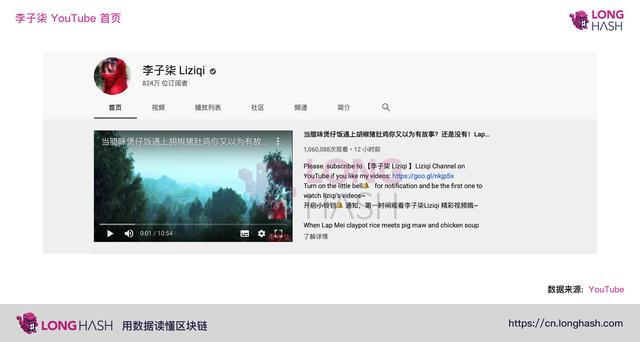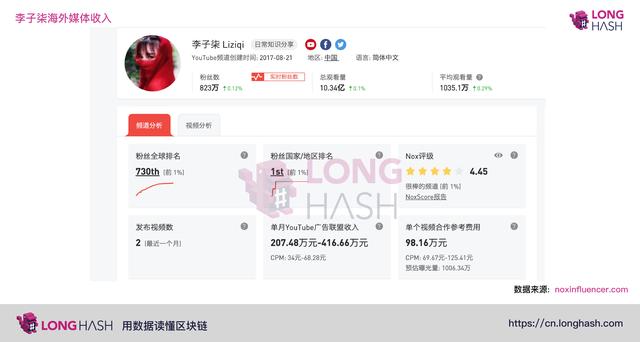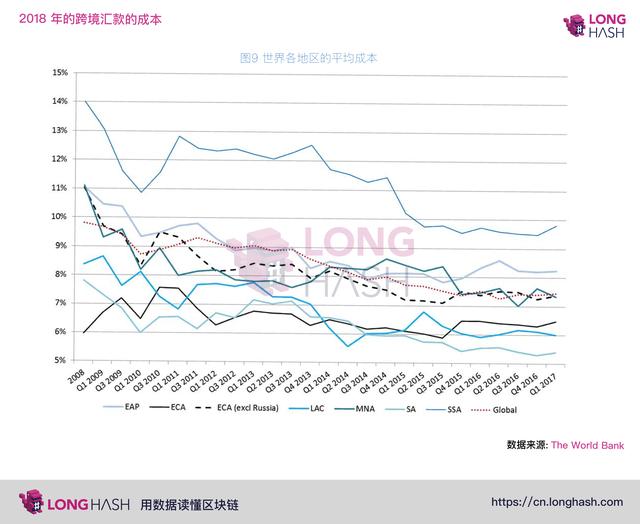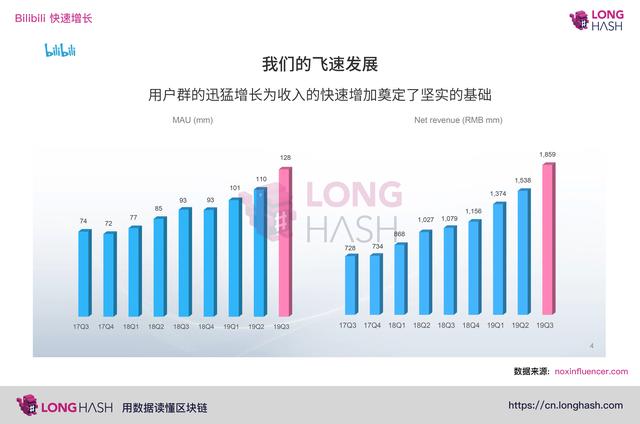Looking at the Future of Digital Currency Payments from the Perspective of the Li Zichen Phenomenon
Source: LongHash
Recently, a very topical figure emerged in China-Li Ziyi. According to the official introduction, she is a girl from Sichuan, China, and a well-known food video blogger in China. In fact, as early as 2017, she gained huge attention in mainland China. Recently, as she has gained more widespread attention in some well-known global media, and on Chinese social media, it has triggered a huge discussion about "whether Li Ziyu is an output of Chinese culture".

Li Ziying mainly publishes some video content of her in rural China, which often has beautiful rural scenery, and how she works in the countryside, making videos of various handicrafts and food content. Let many people who may not be familiar with China, or those who are interested in traditional Chinese culture, start competing to spread her video content. Whether on TikTok or YouTube, there are an incredible number of followers. On YouTube alone, she has 8.27 million followers, which even exceeds the BBC's 5.94 million followers.
- Crypto-derivatives trading hits a new high in the new year, the market may rise due to credit
- A-share market shakes slightly before the holiday
- Intensive reading of the MOV white paper: the winning logic of folk stablecoins from the design philosophy of MOV

There are indeed many points worth discussing about whether the content posted by Li Zizhen is a cultural output, but it is not the focus of this article. We are more interested in her income from overseas media. Because posting videos on YouTube earns ad share, roughly $ 0.6-1.4 per 1000 views. Her monthly income is between RMB 3.883 to RMB 737,900. Let's take a median of 550,000, so the annual advertising revenue is 6.6 million yuan. This is obviously a very good number, after all, this does not include her bringing goods (marketing products), and the huge hidden income that she may get in the future because of her personal influence.
In the past few years, with the development of 4G technology, the network video industry is developing at an alarming rate. In mainland China, video websites based on Youku and iQiyi have become the top kings of industry traffic, and the influence of their productions has begun to leave TV stations and satellite TVs far behind. And short video apps such as vibrato and second shot have become standard in many people's mobile phones. And TikTok, the overseas version of Douyin, is a fast-growing city in the world, and even the famous Facebook has felt its threat. Zuckerberg also acknowledged in the leaked audio that TikTok's parent company, Byte Beat, was China's first technology company to become its main global competitor.
Although TikTok is a very competitive opponent, in the field of self-media video, the biggest player is still YouTube. The United States had more than 180.7 million active YouTube users in 2018, making it the most watched country on YouTube. YouTube was a video-sharing site founded in the United States in February 2005 and was later acquired by Google in 2006. YouTube had 1.58 billion users in 2018, which translates to 11.4% of global YouTube users.
According to the data obtained from the Internet, from the New Year's Day to December 17, 2019, the cumulative views of Li Ziyi's YouTube channel were 790,853,255, of which the top ten geographic regions were Vietnam (19.2%), India ( 15.3%), Indonesia (8.1%), United States (7.0%), Thailand (6.8%), Taiwan (3.3%), Philippines (2.8%), Cambodia (2.5%), Malaysia (2.3%) and Bangladesh (2.0 %). In addition to the United States, Canada (19th, 1.1%) is another European and American country that has entered the top 20. Obviously, in addition to the United States, Li Zihuan ’s main audience is from Asia, that is, a country that relatively understands Chinese culture, but also a place with more Chinese. However, the mainstream languages and cultures of Vietnam and India are quite different from those of China, which also shows that the current phenomenon of Li Zichen indeed represents that Chinese culture is influencing more non-Chinese speaking regions through the Internet.
For a long time, the viewpoint of most people is that online video has strong national or language boundaries, which is why so many video websites have launched completely different versions according to the language and situation of different countries. However, with instant translation technology and diversified and segmented content, many videos are no longer limited to a certain language and a certain region, and can be quickly spread globally through platforms and self-media.
Li Zizhen ’s success also illustrates this point, but the very traditional Chinese culture has received widespread praise and attention from overseas, indicating that cross-cultural communication is no longer an isolated phenomenon, but has gradually become the mainstream. That said, cross-border rewards and payments have started to become more and more in demand.
Although global politics seems to be trending in the opposite direction of globalization, in fact, as the Internet and mobile phones penetrate all corners of the earth, transnational marketing and the spread of influence have exceeded any period in human history. Even traditional luxury brands are no longer the same as in the past, relying entirely on large advertising companies to build their brand influence.
At present, YouTube only supports advertising sharing, and according to the latest YouTube sharing rules, the more publishers at the head get more revenue, the harder it is for those who are at the bottom to get revenue. This is of course more in YouTube ’s own interest. After all, the number of videos that can be recommended on the homepage is limited every time. They also hope to use this policy to support more well-known video producers. But the problem caused by this is that there is a widespread "Matthew Effect", that is, video publishers with a large number of fans similar to Li Zizheng get more revenue, but many ordinary video producers are probably very modest in income.
These ordinary producers have no way to influence current YouTube policies. It is worth noting that the relatively small number of fan subscriptions does not mean that these fans lack the ability to pay. And because YouTube currently relies on the ad-sharing model, video publishers with less fan subscriptions can only get very little share, so we noticed that they often publish their Paypal account on the program to encourage subscriptions Fans of their own channel can pay a fee to support their show.
Obviously, watching advertisements is the simplest and junior mode. Actually, mainland China has already entered the era of anchor rewards. It must be said that due to the unique policy reasons, the development of the Internet in mainland China seems to be independent of the world. China's WeChat and TikTok are not lost to other global Internet giants and are developing in the mobile Internet Extremely fast. What Europe and the United States do not know is that the unique anchor culture has also achieved great success in Asia. Many people spend huge sums of money on some anchor platforms to reward their favorite anchors, and even caused many social problems.
On these anchor platforms, anyone can simply buy platform tokens through third-party payment to reward them, but it seems that a multinational and cross-cultural model is just emerging. We also know that cross-border micropayments are difficult to achieve on existing payment platforms. According to the World Bank report, the cost of cross-border remittances in 2018 will always be more than 7%. Not only is it time consuming and costly, but digital currencies can easily do this.

Whether for short videos like YouTube, Douyin, or real-time interactive live broadcast rewards, digital currencies can easily achieve cross-border micropayments first, and Ethereum or Bitcoin's Lightning Network can be extremely low. Costs complete fast and small payments. Not only can you pay for standard cryptocurrencies such as Bitcoin or Ethereum, but also stable digital currencies such as USDT. The platform can also issue its own digital currency, and even each video publisher can issue its own digital currency for supporters. Give a reward.
It is particularly interesting that digital currency payments are just the beginning. Since all payment traces can be queried on the blockchain, long-term payment data can clearly show the income of the video publisher, that is, these open and transparent payment data itself has great value. These clear revenue data are of great significance to advertisers. Advertisers can also easily use blockchain data to query which video publishers have gained more attention, and the payment ability of fans owned by the video publisher.
In addition, video publishers can even use their previous revenue records to raise funds to produce better video content. Those investors can also invest in these anchors, and through smart contracts, once they have income, they can directly distribute some of them to those investors.
On December 31, 2019, a very good New Year's Eve party was produced by China's very well-known video website Bilibili, and received great attention and praise on the Chinese network. In the party you can see a large number of Japanese anime songs, new anime images created according to traditional Chinese culture, and even the global super hit drama "Game of Thrones" theme symphony performed just after 2019. In the past, these programs will never appear on China's mainstream cultural platform and won wide acclaim.

Since its establishment, Bilibili has relied on producing some non-mainstream video content, mainly attracting young users and Japanese anime enthusiasts, and even a large percentage of them are students. But through ten years of careful operation, the past students have gradually become the main force of society, and thus gradually changed from a non-mainstream media platform to a mainstream media giant. Including China National Television, China Central Television also announced a series of cooperation plans with it.
From this we can see that the subcultures that have not received widespread attention on the Internet gradually moved to the mainstream, and that the various subcultures they promote completely transcend traditional national and language restrictions. I believe that this phenomenon is by no means just in Asia, but the inevitable direction of global cultural development. And the more frequent exchanges and confusion of cultures will inevitably lead to various intricate multinational business models, and no matter what business model, it will inevitably lead to more and more cross-border payment behaviors, and digital currencies may become the best of them catalyst.
LongHash , read the blockchain with data.
We will continue to update Blocking; if you have any questions or suggestions, please contact us!
Was this article helpful?
93 out of 132 found this helpful
Related articles
- Industrial Application Reports | What difficulties does blockchain have in medical and health applications? Attach 10 specific case studies
- Opinion | The first year of the central bank's digital currency, and the sovereign and non-sovereign endorsed digital currency game framework is not yet complete
- Enterprise Ethereum Alliance (EEA) officially releases test network, blockchain era of interoperability is approaching
- Using data to review 2019 of decentralized exchanges
- Analysis of Blockchain Concept Stocks | How Long Can Anni Shares Acquire Hot Spots?
- What laws could be violated by launching a 51% attack?
- Russian cabinet resigns collectively, domestic bitcoin premium $ 200






